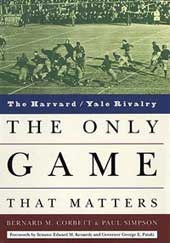The Harvard-Yale football rivalry constitutes a seemingly inexhaustible mine for historians. In The Only Game That Matters (Crown, $24.95), Bernard Corbett and Paul Simpson chronicle the two teams' campaigns of 2002, when a climactic Harvard victory left them deadlocked, 23-23-1, in games played since the Ivy League was formed in 1956. Intercutting the narrative are flashbacks to notable contests of the past among them the initial roundball game, played at Hamilton Park, New Haven, in November 1875 (Harvard 4, Yale 0); the titanic Barry Wood-Albie Booth matchups of 1929-31; and Harvard's miracle finish in the 29-29 tie of 1968.
|
Corbett covers Harvard football as a radio play-by-play announcer, and the book's recountings of pregame chalk talks and sideline decision-making come across with authenticity. Though the text is marred by a few minor errors, the even-handed narration moves along with the pace of a no-huddle offense. Massachusetts senator Edward M. Kennedy '54 (who caught a pass for Harvard's sole touchdown in the 1955 game) and New York governor George Pataki, Yale '67, provide forewords.
The 121st game in the series kicks off at the Stadium on November 20, at 12:30. And yes, The Only Game That Matters takes note of the curious historical fact that in presidential election years since 1940 with the exceptions of 1960 and 1976 the electoral result has telegraphed the outcome of The Game. If a Republican wins, so does Yale. If a Democrat is victorious, the Crimson prevails.
N.B. Harvard has won the last three games in the series. It's been 57 years since either team has won four straight.






